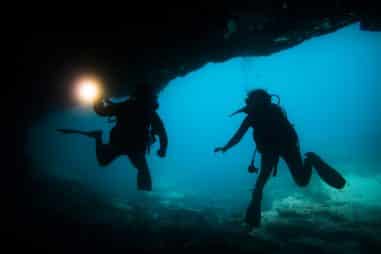
Scuba Diving
Diving is a water sport in which you plunge your whole body into the water. Although, it is more commonly known as jumping from a platform or springboard while performing acrobatic and gymnastic movements in an indoor pool, there are also other practices of diving that are specially done and best enjoyed in the open water.
In some open water diving practices, you will be trained to stay underwater while holding your breath which is the case with freediving. In other practices, however, you would be able to explore the beauty underwater for longer with the help of breathing equipment. An example of this practice is scuba diving.
Scuba is an acronym for “Self-Contained Underwater Breathing Apparatus”. Simply put, when you go scuba diving, you would need to carry and use your own source of breathing gas (usually compressed air) in an air tank during your underwater exploration. Scuba diving may be enjoyed recreationally but it is also usually used for professional applications such as underwater research, military roles, and safety and rescue operations.
Unlike other water sports, you can’t just go straight into scuba diving. There are courses that you should take to be able to be prepared physically, mentally, and psychologically. There are also levels of education that you must finish to go from beginner to advanced to professional. While basic recreational scuba diving is mostly self-regulated and does not require certification, once your skill level progresses, you would need to secure a diver certification. The certification would prove useful in the long run since this can be your jump-off point to other diving practices.
One of these practices includes cave diving. As the name suggests, cave diving is a diving practice where you swim towards water-filled cave systems. In cave diving, you would be swimming underwater in a place where there is an overhead environment presented by the cave’s ceiling. Because of this, as you dive deeper, you will not be able to swim vertically, and your access to the water’s surface, the open air, and the light diminish significantly.
To be able to cave dive, you need to secure a cave diver certification on top of your open water diving and scuba diving certifications. Being an experienced night diver is also a must. To date, it is estimated that there are less than 100 certified and professional cave divers in the world because of the rigorous training and certification requirements.
Scuba and cave diving are both truly exciting sports, but they can pose risks especially if pursued recklessly. Before going setting out into the sea, make sure that your breathing equipment are working well. It is also advisable to only go in the water if you have a diving buddy with you.
Articles about Scuba Diving


